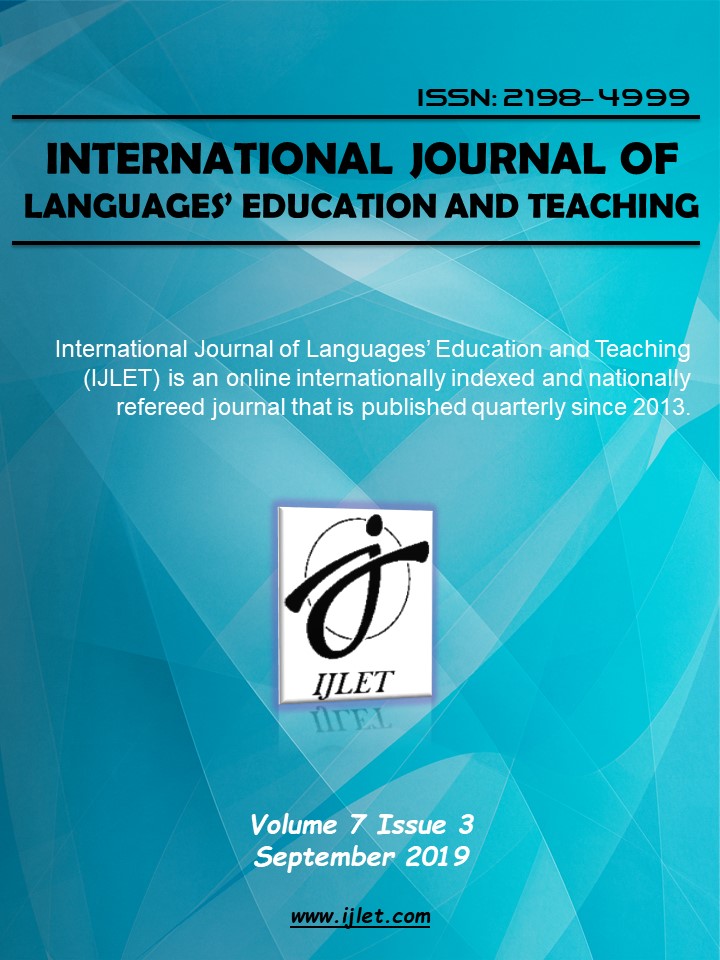Author :
Abstract
The aim of the research is to teach the participants how to use the strategies to write a story and how to evaluate their story according to these strategies. For these purposes, the strategy training was given and a rubric was developed to evaluate the effectiveness of this strategy training and the stories. The study was conducted according to the mixed research method in which a qualitative and quantitative data collection process was used together. In order to determine the effectiveness and functionality of strategies, a seven-week training course was organized with 30 Turkish teacher candidates. The stories written at the end of the strategy training were examined in detail with the rubric. As a result of the examination, it was seen that story writing training given according to cognitive and metacognitive/affective strategies supports the participants’ story writing skills. At the same time, it was determined that the rubric which was developed is a functional measurement tool to evaluate the stories in a suitable and effective manner. Based on this result, it has been suggested that further education related to cognitive and metacognitive/affective strategies should be given in order to support the prospective teachers’ qualifications regarding writing education in vocational education processes.
Keywords
Abstract
The aim of the research is to teach the participants how to use the strategies to write a story and how to evaluate their story according to these strategies. For these purposes, the strategy training was given and a rubric was developed to evaluate the effectiveness of this strategy training and the stories. The study was conducted according to the mixed research method in which a qualitative and quantitative data collection process was used together. In order to determine the effectiveness and functionality of strategies, a seven-week training course was organized with 30 Turkish teacher candidates. The stories written at the end of the strategy training were examined in detail with the rubric. As a result of the examination, it was seen that story writing training given according to cognitive and metacognitive/affective strategies supports the participants’ story writing skills. At the same time, it was determined that the rubric which was developed is a functional measurement tool to evaluate the stories in a suitable and effective manner. Based on this result, it has been suggested that further education related to cognitive and metacognitive/affective strategies should be given in order to support the prospective teachers’ qualifications regarding writing education in vocational education processes.
Keywords
- Ahlsén, E. & Lundh, N. (2007). Teaching writing in theory and practice a study of ways of working with
- Alber-Morgan, S. R., Hessler, T. & Konrad, M. (2007). “Teaching writing for keeps”. Education &
- Raths, J. & Wittrock, M. C. (2001). A taxonomy for learning, teaching, and assessing: a revision of Bloom's
- Aydın, İ. S., İnnalı, H. Ö. & Uyumaz, G. (2017). Developing metacognitional writing strategies
- Bağcı, H. (2007). Türkçe öğretmeni adaylarının yazılı anlatım derslerine yönelik tutumları ile yazma becerileri
- Best, L. (1995). A Critique of cognitive research on writing from three critical perspectives: theoretical,
- Bilgin, N. (2014). Sosyal bilimlerde içerik analizi teknikler ve örnek çalışmalar (genişletilmiş 3. baskı).
- Çer, E. (2017). Türkçe öğretmeni adaylarının yöntem, teknik, strateji ve yaklaşımlara yönelik
- Cheung, Y. L. (2016). Teaching writing. In W. A. Renandya, & H. P. Widodo (Eds.), English Language
- Creswell, J. W. ve Clark V. P. L. (2014).Karma yöntem araştırmaları tasarımı ve yürütülmesi (S. B.
- Creswell, J. W. (2012). Research design. Ankara: Eğiten Kitap.
- Flower, L. & Hayes, J.R, (2014). A cognitive process theory of writing. College Composition and
- Garay, U. & Etxebarria, A. (2012). Combining affective strategies and the internet for learning second
- Graham, S. & Perin, D. (2007). A meta-analysis of writing instruction for adolescent students. Journal of
- Graham, S., Santos, D. & Vanderplank, R. (2011). Exploring the relationship between listening
- İşeri, K. & Ünal, E. (2012). Türkçe öğretmen adaylarının yazma kaygı durumlarının çeşitli değişkenler
- Kassem, H. M. (2015). The relationship between listening strategies used by Egyptianefl college
- Kodituwakku, G. (2009). Metacognitive writing strategies of Sri Lankan secondary school children. Sri
- Krathwohl, D. R., Bloom, B. S., & Masia, B. B. (1964). Taxonomy of educational objectives: The classification
- Lawshe, C. H. (1975). “A quantitative approach to content validity.” Personnel Psychology, 28, p. 563-75.
- Nosratiniaa, M. & Adibifarb, S. (2014). The effect of teaching metacognitive strategies on field-
- Özdemir, B. (2014). Analitik yazma ve değerlendirme modelinin türkçe öğretmeni adaylarının yazma
- Şencan, H. (2005). Sosyal ve davranışsal ölçümlerde güvenilirlik ve geçerlilik. Ankara: Seçkin
- Sonmez, H. (2019). The strategies for designing activity related to listening/following skills and
- Topuzkanamış, E. (2014). The effect of teaching writing strategies on Turkish language teaching
- Türnüklü, A. (2000). Eğitim araştırmalarında etkin olarak kullanılabilecek nitel bir araştırma tekniği:
- White, C. J. (1993). Metacognitive, cognitive, social and affective strategy use in foreign language learning: a
- Wijirahayu, S. & Dorand, P. (2018). Affective strategies, attitudes, and a model of speaking
- performance development for engineering students. Journal of Physics: Conference Series. 948 012024.
- Yamaç, A. & Öztürk, E. (2018). An evaluation of Turkish primary school teachers’ practices and
- Yıldırım, A. & Şimşek, H. (2003). Sosyal bilimlerde nitel araştırma yöntemleri. Ankara: Seçkin Yayınları
- Yıldırım, A., & Şimşek, H. (2013). Sosyal bilimlerde nitel araştırma yöntemleri. Seçkin, Ankara
- Young, A. (2006). Teaching writing across the curriculum. prentice hall resources for writing. Pearson
- Yulisa, D. (2018). Learning to listen: listening strategies and listening comprehension of Islamic senior
- 11 Adapted from (Sonmez, 2019, p.149).
